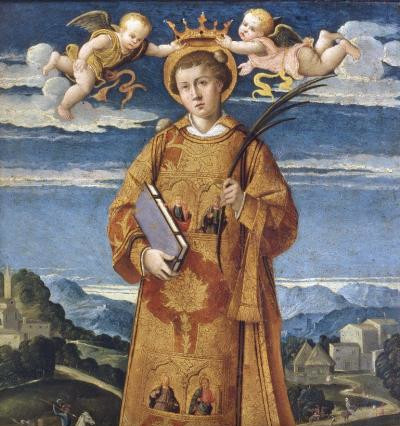
Saint of the Day December 26: St. Stephen
St. Stephen: Life, Martyrdom and Meaning of the First Christian Martyr
Name
St. Stephen
Title
First martyr
Birth
5 A.D.
Death
34 A.D., Jerusalem, Israel
Recurrence
26 December
Prayer
O glorious martyr St. Stephen, for that admirable intrepidity with which you sustained martyrdom, and for that faith and ardor which encouraged you to implore mercy and forgiveness for your stoners, obtain for us also, O St. Stephen, that we may always endure with holy resignation, the contrarieties of life and like you be ready to defend even with blood all the truths of the Faith so that we may one day reach the Heavenly Fatherland So be it.
Patron Saint of
Prato, Biella, Melito di Napoli, Cesano Maderno, Milazzo, Putignano, Vimercate, Qualiano, Mariano Comense, Tradate
Protector of
Masons
Roman Martyrology
In Jerusalem the birthplace of Saint Stephen the Protomartyr, who was stoned to death by the Jews not long after the Ascension of the Lord.
The Saint and Mission
St. Stephen, recognized as the first Christian martyr, embodies a fundamental component of Christian mission: the courageous and unconditional witness of faith. The account of his martyrdom in the Acts of the Apostles not only recounts his ultimate sacrifice but also reveals how his life and death were a powerful example of faith and missionary commitment.
St. Stephen’s mission emerges clearly in his service as one of the Church’s first deacons. This role was not limited to the material distribution of food and resources; it was a ministry of service and love, aimed at assisting and supporting the community of believers. In his diaconal service, Stephen embodied the Christian ideal of love of neighbor, demonstrating how caring for the needy is an integral part of the Christian mission.
In addition to his practical service, Stephen was notable for his bold proclamation of the faith. In the face of opposition and false accusations, he maintained extraordinary firmness and clarity in defending the truth of the gospel. His speech before the Sanhedrin revealed not only a deep understanding of Scripture and salvation history, but also an unwavering commitment to witness to Christ, whatever the cost.
The culmination of his mission was realized at the moment of his martyrdom. In the face of death, Stephen remained true to his faith, looking up to heaven and proclaiming his vision of Christ at the right hand of God. This final act of witness was the seal of his mission, a supreme act of faith and courage that inspires Christians of all ages to remain steadfast in their witness despite persecution and challenges.
The life and martyrdom of St. Stephen is a powerful reminder of the centrality of witness in Christian mission. His example teaches us that mission requires courage, faithfulness and a total commitment to the truth of the Gospel. It also reminds us that even in the face of suffering and death, our greatest hope and strength lie in Christ’s promise and his eternal presence with us.
The Saint and Mercy
St. Stephen, known as the first Christian martyr, offers a profound reflection on mercy through his life and sacrifice. His story, told in the New Testament Book of the Acts of the Apostles, illustrates how mercy can be experienced and witnessed even in the most extreme circumstances.
Mercy in the context of St. Stephen is first manifested in his diaconal service. Stephen was one of seven deacons chosen by the early Christian community to assist the apostles in ministry, particularly in serving the needy and distributing aid. This role was not just an administrative task; it was an act of mercy, a way of caring for the most vulnerable members of the community.
Stephen’s mercy was also revealed in his approach to confrontation and witness. Even in the face of hostility and false accusations, Stephen responded with words of truth and love, bearing witness to his faith with courage and compassion. His speech before the Sanhedrin, full of wisdom and spirit, was an act of mercy toward his accusers, offering them an opportunity to understand the truth he was proclaiming.
The climax of Stephen’s mercy was manifested at the moment of his martyrdom. While being stoned to death, he prayed for his persecutors, asking God not to impute this sin to them. This final gesture of forgiveness and prayer for enemies is one of the most powerful examples of mercy in Scripture, reflecting the teaching and example of Jesus himself on the cross.
The life and martyrdom of St. Stephen reminds us that mercy is a call to live with love, compassion and forgiveness, even in the most difficult circumstances. His example of service, courage in witness and supreme forgiveness inspires us to practice mercy in our daily lives, following in the footsteps of Christ and his saints.
Hagiography
Stephen was the first to give his life and blood for Jesus Christ. A Jew by birth, and converted to the faith by the preaching of St. Peter, he immediately showed a wonderful zeal for the glory of God and great wisdom in refuting the unbelieving Jews who despised the Nazarene.
He was elected by the Apostles first of the seven deacons to provide for the needs of the first faithful, especially the widows and orphans for whom the Church always took special care.
And St. Stephen full of grace and fortitude, animated by the Holy Spirit preached with power and…
